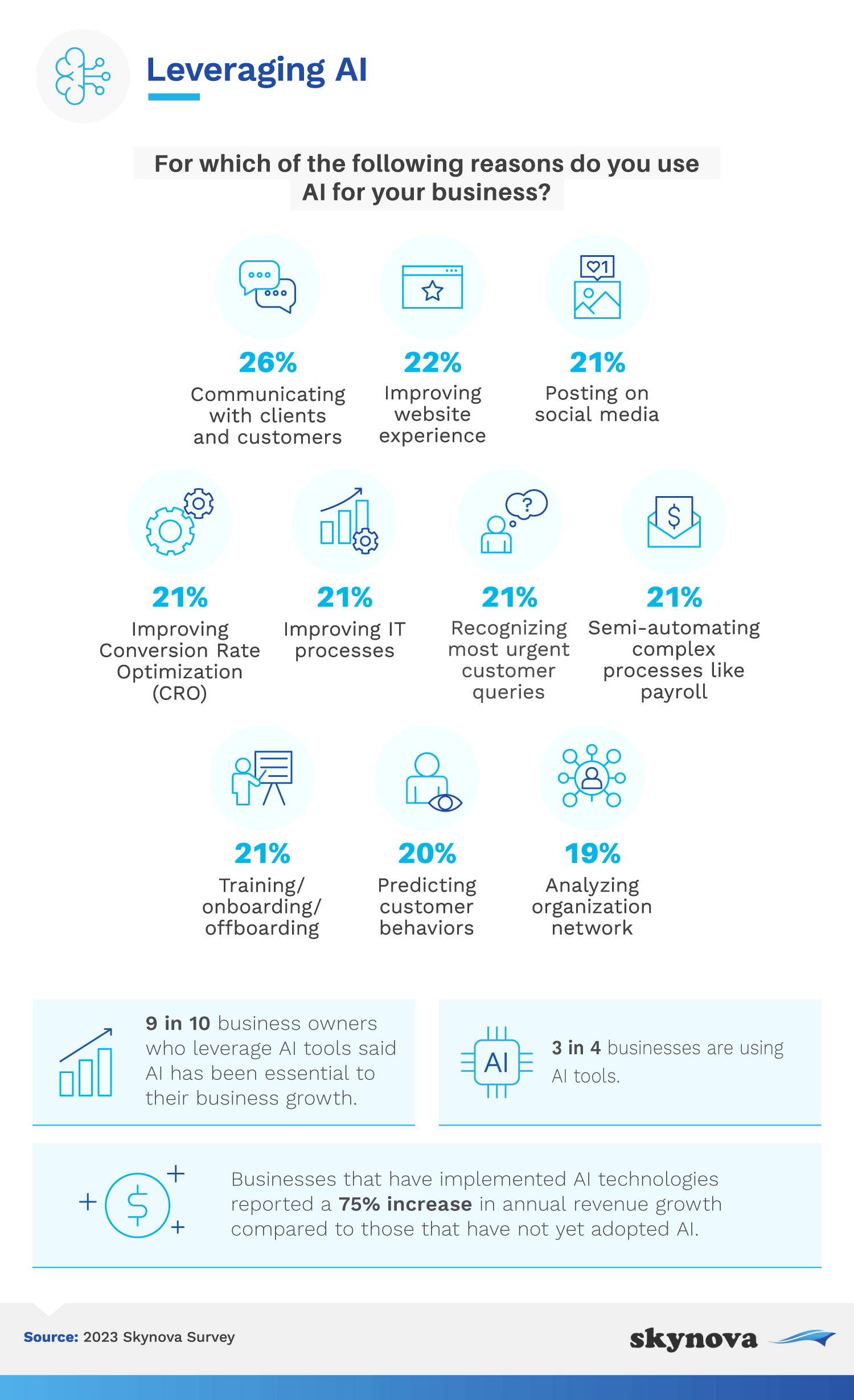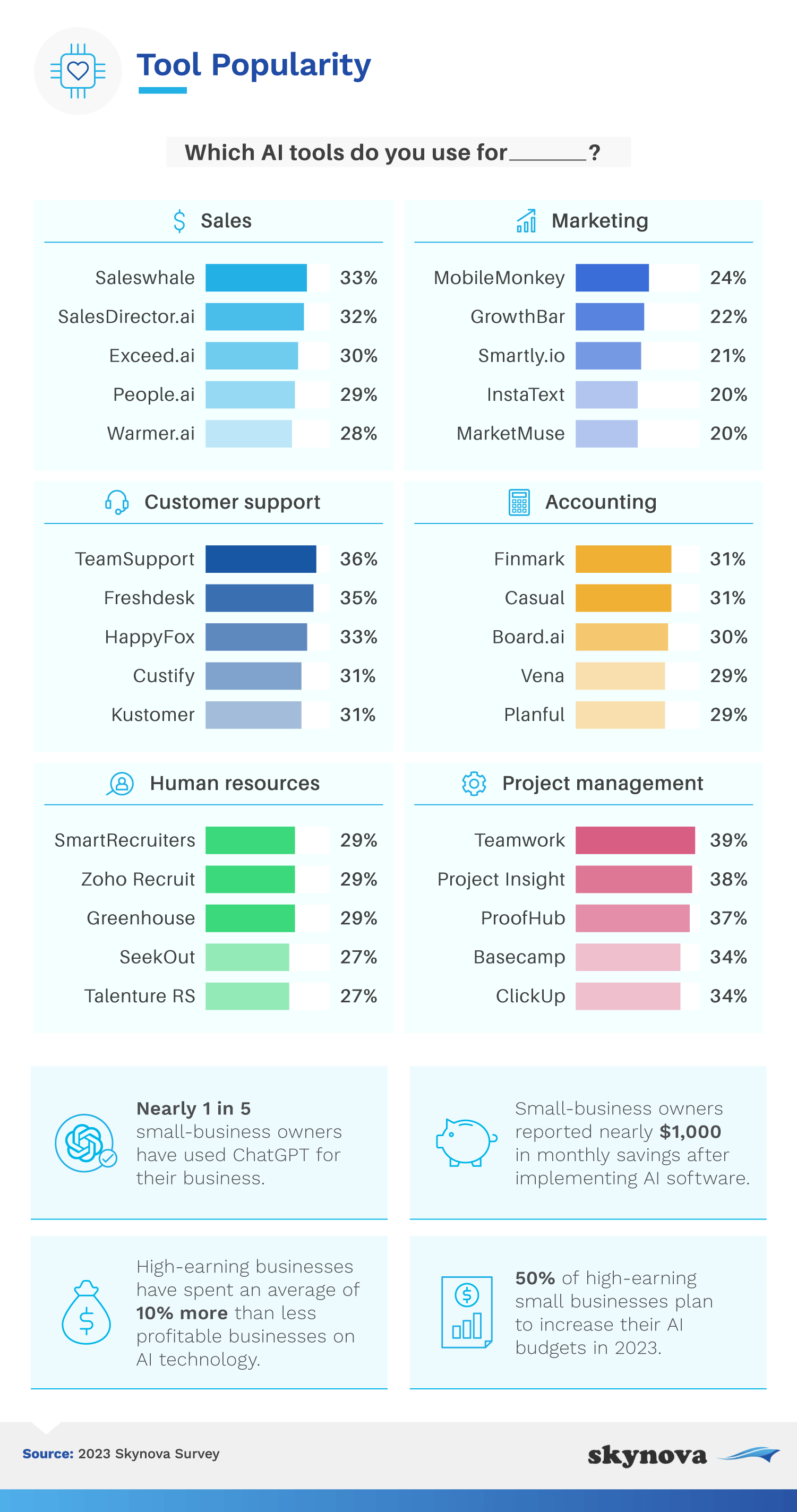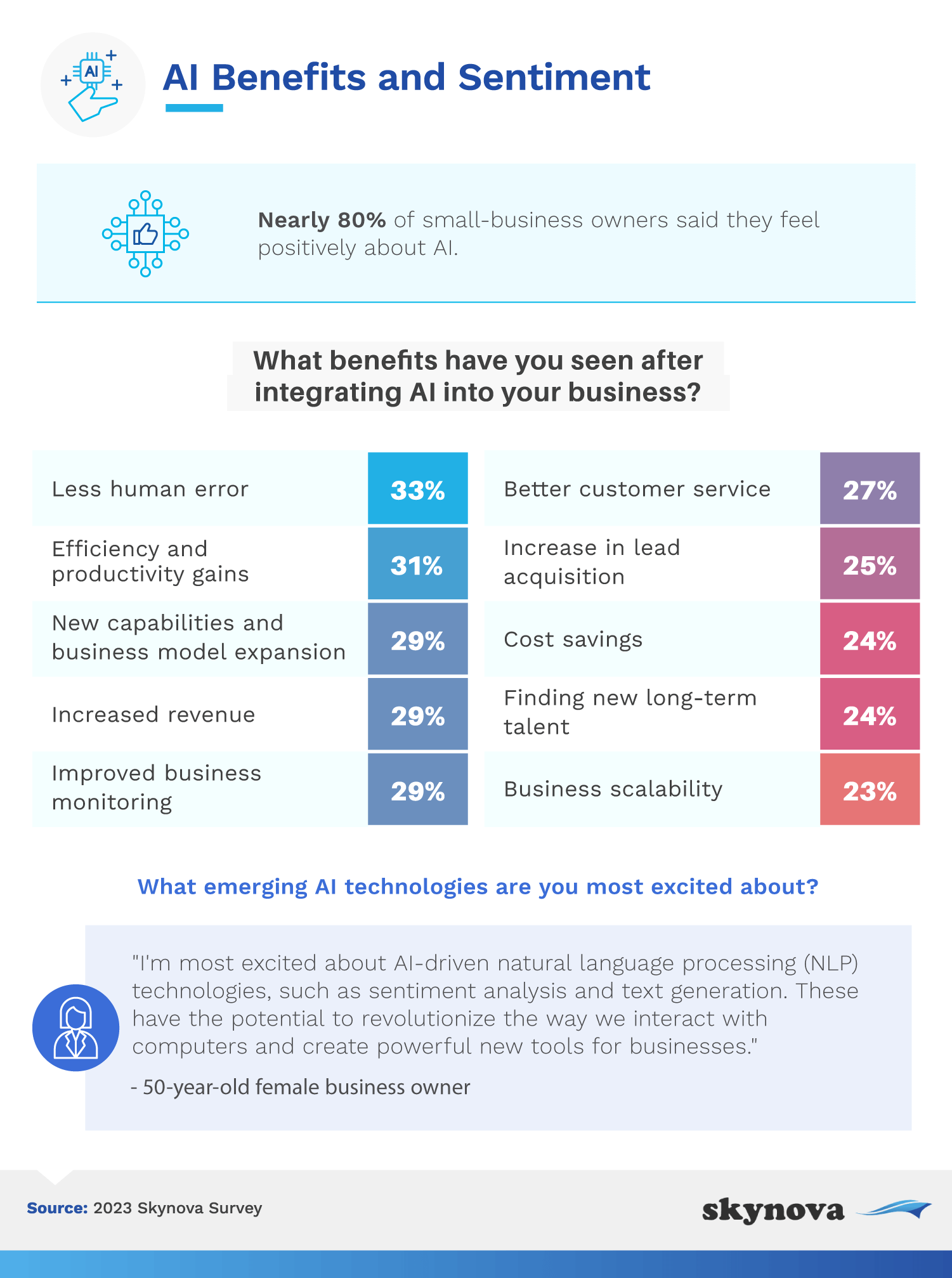
|
It's unlikely that AI will be taking over any time soon, but small businesses will likely face increasing competition from others that better marshal their AI tools. We surveyed 1,000 small-business owners to learn which of these tools are the most useful for small businesses and how they're being utilized.
If you're new to AI or on the fence, the results may surprise you. All new tools have a learning curve, but once you are past the hump, you could see significant financial savings. Read on to find out how you can use AI to boost your business.
The applications for AI in small businesses run the gamut from communicating with customers to automating complex processes such as payroll and data analysis. The ways small businesses use AI are a nearly even mix of customer-facing and internal-facing functions.

Arguably one of the most significant findings in our study is that businesses that have implemented AI have experienced far greater revenue growth than those that haven't. Of those who have, the increase in their annual revenue growth was 75%. Nine in 10 who deployed AI tools consider AI indispensable, as it has been essential to their business growth.
AI excels at automation by reducing human error and increasing productivity. Our study shows that the No. 1 reason small businesses have deployed AI was to communicate with customers and clients. AI shines at this in so many ways. One of the key uses is identifying and scoring the urgency of a customer's query. This helps companies handle urgent problems faster, converting potentially unhappy customers into satisfied ones.
Another study about AI in business reports that 92% of online shoppers have experienced AI customer service, and 72% have no resistance to working with this nonhuman form of support. More needs to be done to turn the remaining 28% into customers who are fully satisfied with AI support before you cut those human telephone support lines and chat, but 72% tolerance for AI is a robust success by any measure.
A 2022 paper published in the Harvard Business Review hits on a key aspect that will likely dramatically improve the AI support experience in the coming years, raising the acceptance level and customer satisfaction. It's the use of AI to deeply personalize the entire customer experience, from shopping to support. As this tactic proves more successful in large corporations, it likely will only be a matter of time before more of these improvements are incorporated into the AI tools available to every business.
Half of high-earning small businesses plan on increasing their AI budget this year. Let's go over where they're focusing their AI spending.

Successful high-earning businesses spent 10% more of their budget on AI than their less profitable competitors. The tools these companies invested in varied. Project management was the area where the companies surveyed used AI tools the most, with Teamwork, Project Insight, and ProofHub being the most used across all categories. The No. 2 area of usage went to customer support, which was also the top reason companies in our survey implemented AI.
Some of the most cutting-edge AI tools are finding their way into small businesses. For example, nearly 20% of businesses we surveyed use ChatGPT. There are many other chatbots, but ChatGPT is the one making all the news.
ChatGPT has many cost-saving business applications. One obvious use is to employ it to create first drafts for emails and other forms of communication. You can also use it to generate titles and subject lines. With a small amount of programming, ChatGPT can be easily integrated with websites and other tools. It's likely that integration with an entire range of business applications will become even easier and broader in the near future. ChatGPT can become an expert at answering customer questions. It can even be used for writing and debugging code.
Chatbots like ChatGPT are in their toddler stage, and prudent businesses will use them only with human oversight. It has the potential to create objectionable content with racial and gender bias, as users have recently discovered. From the start, ChatGPT's developers implemented strong guardrails to prevent any infamous mistakes like those made by other chatbots, such as Microsoft's Tay chatbot in 2016 or Meta's BlenderBot in 2022. These guardrails will likely need to be fine-tuned as time goes on.
Since most small-business owners reported feeling positive about AI, it seems clear that AI is the future, and that future is fast approaching. Small businesses on the tail end of this wave instead of the leading edge could be at risk.

Less human error was the No. 1 benefit surveyed businesses have experienced from using AI, according to 33% of respondents. Even if you think you're not using AI error-reduction tools in your business, you might be doing so without even knowing it. For example, the popular grammar tool, Grammarly uses AI. The same is true for the spelling and grammar checkers in Microsoft Word. This trend of AI integration with Microsoft's products will only grow now that Microsoft has invested $10 billion in OpenAI (the developer of ChatGPT). The same is true across a broad range of other common software tools.
Efficiency and productivity gains were another way in which AI has helped 31% of the small businesses we studied. Unsurprisingly, one of the key areas where AI reductions in overhead are occurring is customer service.
AI is changing the way many people do business. Of the small-businesses owners we surveyed, 29% reported new capabilities and business model expansions as benefits of using AI. It's likely that these are narrowly focused on things like customer service, barely scratching the surface of the full benefits of AI. The one thing we can say with reasonable confidence is that the future of AI in small businesses will be bigger and bolder than anyone is thinking right now.
There's no stuffing the AI genie back into the bottle. The majority of small businesses are already using AI tools, and those that have are reporting large increases in revenue and significant monthly savings. Successful high-earning businesses are also spending more on AI than their competitors. These are all indications that it might be wise for small businesses to consider expanding the use of AI in their businesses (if they haven't already).
As is common practice with software deployment and development projects, it's best not to jump in with both feet and aim for the moon. Implementing AI in baby steps and focusing on the simplest areas of automation before going for a full AI overhaul will likely be the safest bet.
Skynova provides online invoicing for small businesses. We help businesses get paid faster by simplifying and speeding up the billing process.
We surveyed 1,000 successful small-business owners. The mean age of respondents was 34 years old. Among them, 63% were male, and 37% were female. Respondents comprised the following generational breakdown: 17% Gen Z, 60% millennials, 17% Gen X, and 6% baby boomers.
Are you fascinated by how AI is helping small businesses grow and profit? Feel free to share this article with anyone you'd like. We just ask that you do so for noncommercial purposes only and provide a link back to this page to give the authors their due credit.